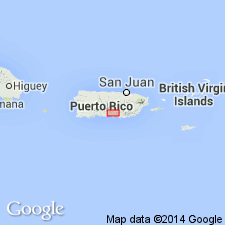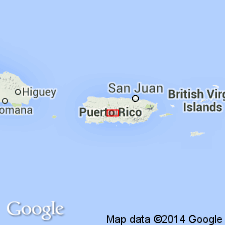
- Usage in publication:
-
- Rio Prieto Formation*
- Modifications:
-
- Revised
Summary:
The Jacaguas Group of Pessagno (1960a) is here adopted, as well as the Miramar, Guayo, and Rio Descalabrado Members of the Naranjo Formation of Pessagno (1960a) and the Los Puertos Member of the Naranjo of Pessagno (1960b). The Miramar Conglomerate Member is removed from the Rio Prieto Formation and revised as the Miramar Formation of the Jacaguas. [The Miramar was described as a member of both the Naranjo and the Rio Prieto]. Formations of the Jacaguas are, in ascending order: Miramar, Los Puertos, Raspaldo, disconformity, Cuevas, Guayo, Rio Descalabrado. Age is Late Cretaceous (Maastrichtian) to middle Eocene. The Miramar may be a transgressive unit that ranges in age from Maastrichtian in the southeast to Paleocene(?) and Eocene in the Jayuya quadrangle to the northwest.
Source: GNU records (USGS DDS-6; Reston GNULEX).

- Usage in publication:
-
- Rio Prieto Formation*
- Modifications:
-
- Named
- Dominant lithology:
-
- Conglomerate
- Limestone
- Sandstone
- Mudstone
Summary:
The Rio Prieto Formation, here named, is an interfingering complex of several members: the basal Miramar Conglomerate Member, an algal limestone member, a volcanic sandstone and mudstone member, and a lapilli tuff and volcanic sandstone member at the top. Type localities are given for each of the members. Unconformably overlies Cretaceous and plutonic rocks; conformably underlies the Monserrate Formation. Age is middle Eocene based on fossils.
Source: GNU records (USGS DDS-6; Reston GNULEX).
For more information, please contact Nancy Stamm, Geologic Names Committee Secretary.
Asterisk (*) indicates published by U.S. Geological Survey authors.
"No current usage" (†) implies that a name has been abandoned or has fallen into disuse. Former usage and, if known, replacement name given in parentheses ( ).
Slash (/) indicates name conflicts with nomenclatural guidelines (CSN, 1933; ACSN, 1961, 1970; NACSN, 1983, 2005, 2021). May be explained within brackets ([ ]).

